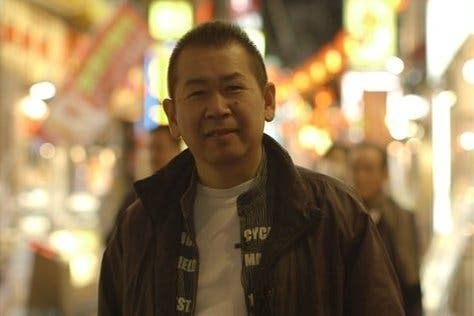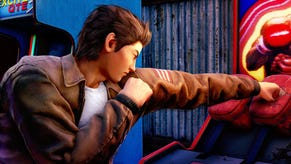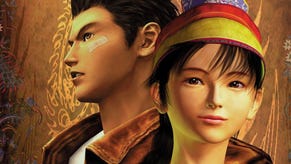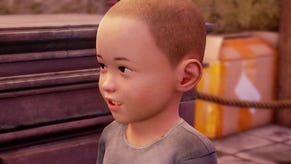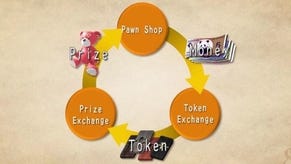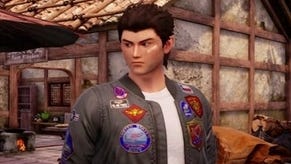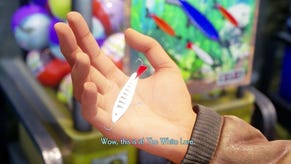"I could do with a bit more money!": Yu Suzuki on the return of Shenmue
And how Shenmue 3 won't be the final chapter in Ryo's tale.
Yu Suzuki doesn't have as much time as he used to. For the past five years, the director and designer famous for classic Sega games such as Out Run, Afterburner and Virtua Fighter has been making the daily 90-minute commute to his small office in Ebisu, a district in Tokyo's Shibuya ward, to tinker with ideas and designs. To call his life leisurely would be a stretch, but he's been out of the public eye for much of that time, working on mobile games that never made their way to the west, and on ideas that never made their way to fruition. In June this year, Suzuki made his return to big-name games development in the grandest possible way.
I'm still not entirely sure it was for real. When Sony held its E3 conference this summer, it was creeping up to 3am in the UK, and the darkness was already beginning to thin outside Eurogamer's Brighton office as the sucker punches were being landed. First, Square Enix silenced years of fan requests as it announced the Final Fantasy 7 remake was in production, and it was coming to PlayStation 4. But that wasn't the real show-stopper. As cherry blossoms began to fall on-screen and a Chinese flute started to play, it became apparent that something very strange, and something very special was about to happen. Shenmue 3, Yu Suzuki's open-world sequel that's been in the wilderness for so long it's turned into a modern-day myth, was set to become a reality.
"Before I came on stage, there was Final Fantasy 7. It was such a huge reception from the crowd! I was really worried how people were going to take it." I caught up with Suzuki during last month's Tokyo Game Show, where we talk amid the tinkle of delicate coffee cups in the New Otani hotel's top-floor cafe. Wearing a fleece jacket emblazoned in logos for the UK motorbike company Norton, there's still something of the old rebel about him, even if it's been softened with age. "When Final Fantasy came on, people were like 'raaaaagh,'" Suzuki says, his face lighting up with a smile. "When it was Shenmue, it was more like 'squuuuueeeee'. People all over were coming to give me congratulations, to pat me on the back. It was unreal."
Since that grand reveal, Suzuki's life has changed. Now he gets into his office for 6.30am, leaving at 10pm for the hour and a half journey back home. And now he's working through weekends, too. He doesn't have time to indulge in his hobbies, like billiards, but he seems happier, more animated than when I last met him. Back then he was unable to talk freely about Shenmue 3, though clearly it consumed him. Now he's back in his prime, working the long hours he once revelled in - AM2, his old department at Sega, earned its name as they'd always be working at two in the morning - and enjoying getting stuck into development on this scale again. Don't, though, call it a comeback.
"I've always been in the industry!" Suzuki playfully protests when asked whether his absence from console gaming for nearly 15 years puts him at a disadvantage. "That's true, though. It's not particularly a disadvantage. And making big games is more fun."
Suzuki hasn't a console credit to his name in those years, but Shenmue 3 has stayed with him since its predecessor was released in 2001. Releasing when its home platform, the ill-fated Dreamcast, was already dead in the water, the prospect of Sega funding another costly instalment was always dim. It's only been in recent years that Shenmue 3 has become a possibility.
"After Shenmue 2 was released, within three years people were asking how I was going to do Shenmue 3. Ryan Payton [producer on Metal Gear Solid 4, and designer of Kickstarter success story Republique], he's a huge Shenmue fan. He told me if I used Kickstarter I could get the funding for Shenmue 3. It was one or two years after that when I started seriously looking into using Kickstarter - it was Ryan Payton, though, who gave me the original idea."
Shenmue 3's Kickstarter has been, by any reasonable measure, a success. Within 102 minutes of going live, it had raised $1m - earning itself a world record for being the fastest game to break that barrier via a crowdfunding platform. By the time the campaign finish, with $6.3m pledged, Shenmue 3 had become Kickstarter's highest-funded video game project. Despite those numbers, though, and despite that success, there have been concerns for Shenmue 3. The original games were grand, sumptuous productions with a reported budget of $70m at the time - raising the question of whether Shenmue 3 can match fan expectations with relatively limited means.
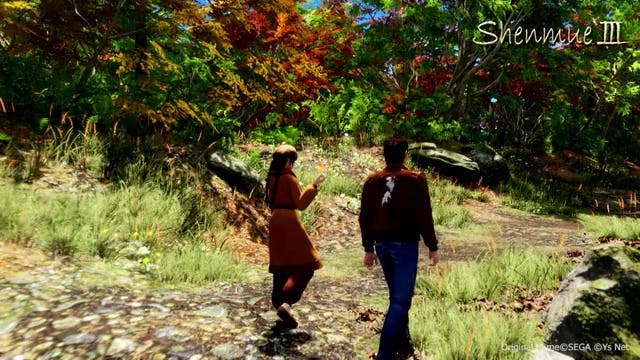
"Kickstarter's not the only source of money," says Suzuki. "There's also funding from Sony and Shibuya Productions. Before we started Kickstarter, we had goals set around the budget - so if we only got $6 million, we'd create Shenmue 3 based upon what we could do with that $6 million." During Tokyo Game Show, the option to back the game via PayPal was announced, another revenue stream for Shenmue 3. "We're still trying to gather funds. Obviously, the more money we have the more we can do. Even if we don't get as much budget as the previous games, we'll still make this game."
Can Suzuki make the game that he wants, though, with the resources and technology at hand? "I could do with a bit more money! The game itself doesn't have to be gorgeous visually - a lot of the money these days goes into the graphics. If we perhaps compromise on the graphics and put more into the story, we can make a good game. The most important thing, to me, is that the game's interesting, and that it's something people want to play."
How interesting can a game whose foundations remain in 1999, before the open world revolution it helped start, be for a modern audience? The format for Shenmue 3 remains largely untouched from the one laid out at the series' genesis in the 90s. "We had a clear format through to Shenmue 3. This time, we readjusted the structure, and made a new story for Shenmue 3. It's not exactly the same as the one we initially planned, though it has some overlap. The concept's the same. The essential idea and concept has never changed. What's changed is what's possible with the technology available. The idea, and the concept, hasn't changed. The tool - Unreal Engine 4 [the engine being used for Shenmue 3] - that's changed."
I'm actually pleased that Shenmue won't be modernised - that it won't be stuffed full of markers and objectives, and that its map won't be conquered slowly over time by taking down Lucky Hit parlour owners. Shenmue's open worlds were always strange, plodding places, but it's precisely that which has helped them retain their appeal, and which makes returning to the originals worthwhile even now. Hearing that Shenmue 3 is looking to retain that, and more besides, is heartening.
"Shenmue was made in 1999, but the game was set in 1986, based in Japan and China," says Suzuki of what he feels makes the originals special, and what he hopes to hold on to for Shenmue 3. "One of the themes, the main feelings that you get from the game is a feeling of nostalgia. That's one of the special qualities of Shenmue, and the fact it was one of the first open world games. That theme, that feeling of nostalgia, continues in all the games. Each game has its own separate appeal of itself, too."
The original Shenmue had its own grounded sense of fantasy, as well - playing it first time around, as a teenager besotted with Japan, it managed to transport me to another place entirely, and one that was all the more believable, and all the more fantastical, for its mundanity. "You were a teen when you played Shenmue! Yeah, we plan to do that in Shenmue 3. It makes me think of another distinctive quality of Shenmue. It represents the everyday in Japan. It's super-realism, and standard everyday life in Japan. If you're looking at it from a US or European perspective, it's not fantasy like Final Fantasy, but it's something you don't experience in your everyday life. That's one of the important elements of Shenmue."
Towards the end of Shenmue 2, more fantastical elements began to creep in, though. The floating sword Ryo and Shenhua come across in that Guilin cave always had me worried that Shenmue 3 would throw away the mundane in favour of magic. "When we made Shenmue 2, we knew it was the last one," Suzuki reassures me. "We decided to go out with a bang - that's why there are those fantastical elements in there! Also, in China and in Japan, there's a strong belief, like in England and with Stonehenge and the druids, we get energy from the spirits and the trees and nature. It's called ki, and it translates as feeling and emotion. It's not the same as fantastical fairies and demons - it's more to do with a natural, basic power. We're considering bringing that element into Shenmue 3."
Unlike the latter stages of Shenmue 2, Shenmue 3 will pare back the combat in favour of story. Shenmue 3 won't, though, conclude Ryo's story. "Originally, as you know, there was going to be 11 chapters. It was only ever going to be two games. When we began development, the volume of the story was too big for one game. When we decided it was going to be two games, most of the story was already complete. To fit all of the rest of the 11 chapters into Shenmue 3, it could help the story progress, but it'd lose it's playability. Shenmue's a game, not a novel - if it loses its playability, it loses its purpose, so it's not the final part."
It's too early to talk about Shenmue 4, of course - Suzuki merely chuckles when I bring it up - but it appears it's something that's going to have to happen if fans are to get the closure they desire. For now, though, Suzuki is head-down in development for Shenmue 3, slowly progressing towards the release at the end of 2017.
"One of the biggest differences between now and at Sega is I had my own development department with a team I'd worked with before. Now, I have to put together my own team - that's been one of the biggest differences. Once I knew the Kickstarter campaign was going ahead, I got in touch with people I used to work with at Sega, and asked if they wanted to do it or not. That's basically how I got the team together! Of course, research is important as well - not just the people, but the technology we have now.
"Kickstarter's finished, so we know what the minimum budget is. We completed the game flow at the end of August, this month we're testing the game engine for Shenmue to see how it works. The team's a lot smaller than when we was working on Shenmue 2. But the process is just beginning - at this point we only need a small team. We said we'd get it out for Christmas 2017. Now I've got to work towards that, because that's what I said."
Thanks to Heidi Karino for providing translation.
